#also I can’t forget when the Hulk had that trial in I think the early 70s
Text
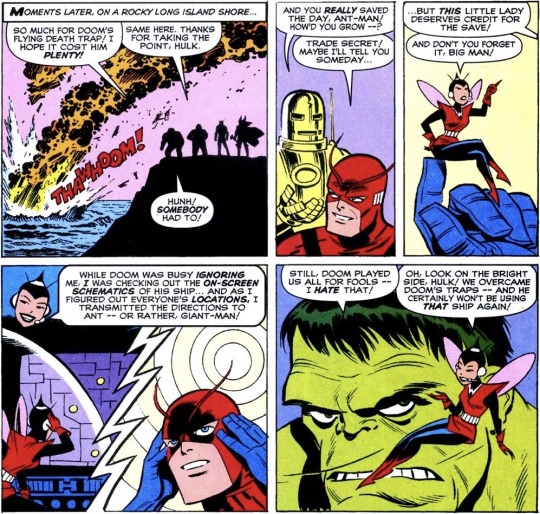
The Avengers (1963) #1.5 (published September 1999)
#throughout this issue I think that Tony is the only one that wasn’t ever mean to the Hulk#like Janet Thor and Hank all have moments where they insulted him and/or were frustrated with him#but Tony takes it even further by saying ‘thanks for taking the point Hulk’#referring to how the Hulk wouldn’t listen to the others and was impatient and just acted which made the others have to follow suit#actually that happens earlier in the issue to when they first get to Doom’s ship and the Hulk rushes in before everyone else#and Thor is bothered but Tony defends him and says that the Hulk might have the right idea#cause they might have better luck finding Doom if they split up#not to suggest that Tony is like always great with the Hulk and the rest of the Avengers alienated him#there’s a great issue with Hank after the Hulk leaves the team where Hank tries to find him on his own to try to help him#also I can’t forget when the Hulk had that trial in I think the early 70s#and Tony basically argued that it was wrong to give the Hulk the death penalty cause that would mean killing Bruce Banner#like no defending the Hulk himself at all#anyway it’s been a bit since I read these early Avengers issues and I don’t remember all the dynamics entirely#from the Hulk’s brief stint on the team#so this little discussion about Tony and the Hulk is just about how it was portrayed in this issue#marvel#tony stark#bruce banner#my posts#comic panels
1 note
·
View note
Text
1960s Sue Storm: A Recuperative, Feminist Reading
I’m not going to pretend that comics in the 1960s weren’t sexist by today’s standards. Of course they were. All popular media from that time was. Second Wave Feminism, at the time Sue first appeared in November of 1961, was still in its infancy and hadn’t yet made its way into popular consciousness (Betty Friedan’s groundbreaking feminist tract, The Feminine Mystique, wouldn’t be published until 1963). Pointing out all of the ways in which Lee/Kirby’s run on the Fantastic Four is sexist is not much of a challenge and not very interesting — what I’m going to do by reading 1960s Sue against the grain is something far more nuanced that I hope will restore some of the agency that fandom interpretations have stripped away from her. I am striving for a recuperative reading of 1960s Sue Storm, one that pushes back against the fairly common and pernicious notion that she is or ever has been “just” a meek and mild housewife, because she never has been that, and I think that highlighting the degree of agency, strength, and courage she had even in the 1960s will help emphasize that. I don’t find the complete and total erasure of the level of agency Sue did, in fact, possess in the 1960s to be particularly nuanced or feminist because it ignores how transgressive she would have seemed at the time. So I am going to point to moments during Lee/Kirby’s run where Sue exhibited agency, strength, and power that were feminist for the period in which they were written, while simultaneously acknowledging that the narrative frequently undercuts and underserves her. I am not at all pretending that any of this was intentional on Jack Kirby or Stan Lee’s part -- I don’t and can’t know that, and frankly, I don’t think it matters in this context.
To begin with, Sue’s invisibility can be read as a critique of sexism, since it grants her both the ability to escape the male gaze and to weaponize her societal invisibility as a woman. I’m sure we’ve all heard of Ellison’s 1952 novel Invisible Man, which comments on both the hyper- and invisibility of black men. The manner in which Sue’s powers function is not unconnected to Ellison’s nameless Invisible Man. Sue’s physical beauty always exposed her to a great deal of unwanted male attention, but that surely escalated after she became famous as a member of the FF, thus becoming hypervisible to a degree she hadn’t been before. We see this in Fantastic Four v1 #10, when a strange man on the street recognizes Sue and interprets her fame as permission to harass her. Her invisibility allows her to dodge him and his gaze while she vehemently condemns his misogynistic behavior.

Note that it’s specifically framed as Sue resisting, by turning invisible, his reductive view of her as a beautiful object that exists for his pleasure and not much else. “Mmm -- you shouldn’t ever turn invisible, doll!” he tells her. “How’s about a smile for one of your fans??” This is immediately followed by Sue directly defying him by both refusing to smile and turning invisible, thus removing herself from his sexualizing male gaze. Sue’s invisibility is in this way feminist and transgressive -- if women within the highly patriarchal society of the U.S. in the 1960s were given little choice but to exist as sexual objects on display for the titillation of the men around them, their subjectivity and humanity stripped from them, Sue’s invisibility gave her the power to defy that narrow categorization and control when she is seen and by whom. She claimed for herself the power to remove herself from the patriarchal male gaze that sexualized and dehumanized her whenever she wished.
Cut for length.
Her invisibility also allows her to transgressively wield her enemies’ sexist tendency to overlook and underestimate her against them (i.e., treat her as though she is insignificant and thus invisible). She is only successful in defeating male villains when she turns invisible because none of them ever think to wonder what happened to the FF’s female member. They are too busy focusing on the men, who they mistakenly view as more powerful and thus more of a threat than a mere woman. In Fantastic Four #5, for instance, Victor Von Doom demands that Sue surrender herself as a hostage so that he can coerce the male members of the team into doing as he demands. Victor’s plan hinges around Sue being a helpless damsel in distress, but Sue turns the tables on Victor by making the decision to go with Victor part of HER plan to gather information and draw him out into the open. Notice that Reed defers to Sue’s leadership here:

And her plan ultimately works. She defeats Victor and rescues herself and her teammates, all of whom would have been murdered by Victor if not for her. She is able to do so only because Victor does not deem her much of a threat and therefore overlooks her. She might as well have been invisible, as far as he was concerned—and she uses that fact to defeat him.
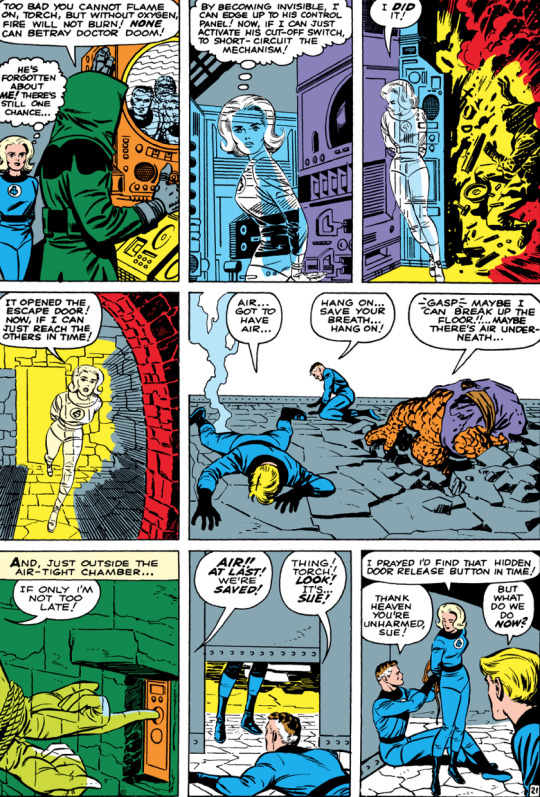
This overlooking of Sue by male antagonists happens repeatedly -- for instance in Fantastic Four v1 #95, when the Monocle also forgets about Sue completely:
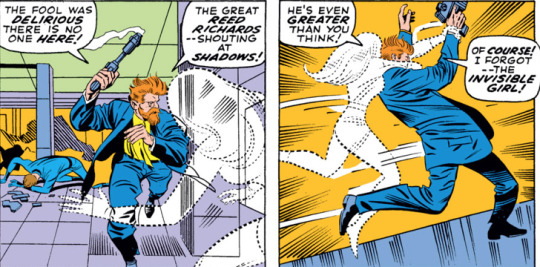
Fantastic Four #5 is not the only time in the 1960s that Reed defers to Sue and her leadership, might I add -- in Fantastic Four v1 #20, Sue proposes one that centers around her taking the Molecule Man’s wand away, and Reed agrees to play bait for her:
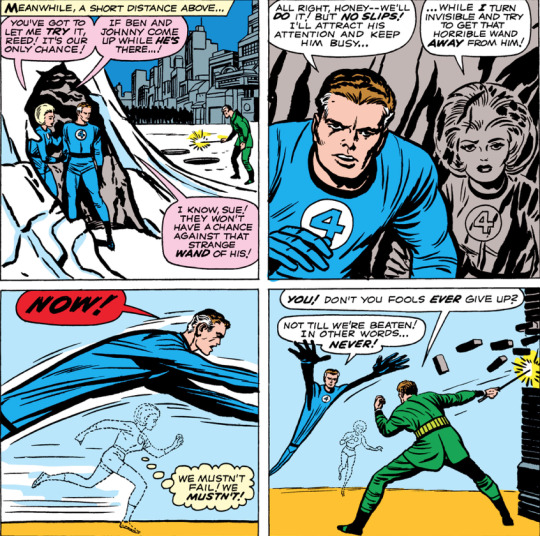
They are working as a team here, as equal partners, which is what Lee at least presented Sue as, even if his ability to imagine what equality for a woman looked like was severely limited. Within the comics themselves, Sue herself has always insisted on equality both as a team member and as Reed’s lover and, later on, wife. In 1964′s Fantastic Four Annual #2, Reed, concerned with his girlfriend’s safety, decides that Doom is far too dangerous an enemy for Sue to go up against, but Sue insists on being treated like a full member of the team, as she always has been—and even threatens to break up with Reed if dating him means that she’ll be left behind on dangerous missions.
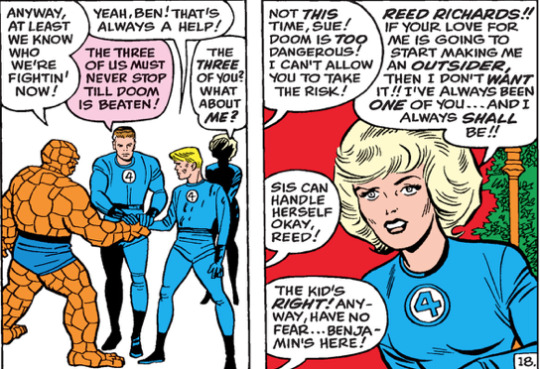
And she actually follows through on that threat nearly a decade later in 1973′s Fantastic Four v1 #130, which takes place after they’re married and have a son. The Frightful Four attack and Sue participates in the battle, but when Reed orders her to get their infant son to safety and Sue doesn’t listen, they get into an argument. Reed is livid that Sue (recklessly, he believes) prioritized remaining in the fight over their baby’s life, and Sue is equally furious that Reed is treating her as though Franklin’s mother is all she is rather than as an equal teammate. She then leaves him for the first of two times (the other being during Civil War I).
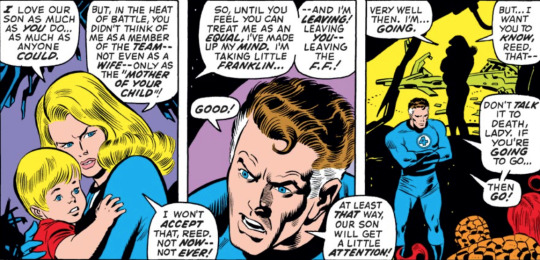
When they reunite, Sue is adamant that she be treated as an equal by all of them. Reed struggles at first to stop being so overprotective of Sue, but he does his best to comply because she has been very clear that if he does not, he will lose her permanently. By the time Marvel Two-In-One v1 #67 was published in 1980, he is able to tell Ben that he’s made his peace with the fact that Sue has just as much right to put herself in harm’s way as he does:
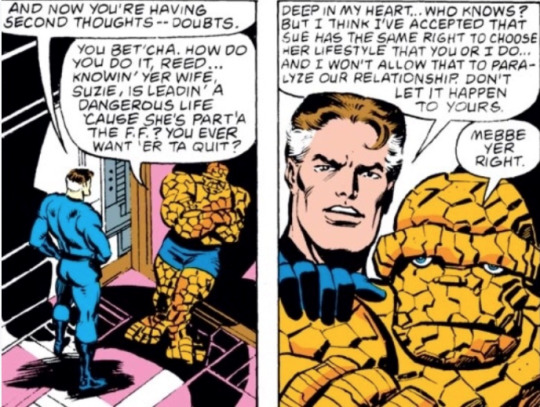
It’s worth noting also that in every version of the origin story, Sue’s decision to become a superhero—i.e., a warrior, on active, front-line duty—is never questioned by Reed, Ben, or Johnny (contrast that with Wonder Woman two decades or so earlier, who was initially relegated to being the Justice Society’s secretary). As a matter of fact, while Reed mentions in Fantastic Four v1 #22, the issue where Sue develops the ability to create forcefields, that Sue has been doubting the value of her powers and her usefulness to the team, he emphasizes that, to the contrary, she is “about to become the star member.” So not only has Sue always been a member of the FF, 22 issues after her first appearance she was already being presented as its most powerful member thanks to her forcefields. Needless to say, the fact that Sue was not only a member of the FF but also explicitly its most powerful member was fairly groundbreaking for the 1960s. I struggle to think of another team from that time period that could say that its female member(s) were the most powerful or that their superiority was openly acknowledged by every male member of the team.
Sue was also an active part of the team from the beginning and went everywhere her team members did—to the moon, other planets, other dimensions, Monster Island, the heart of Latveria, up against the Hulk, Skrulls, the Molecule Man, etc.—no matter how dangerous. She occasionally even spearheaded their attacks on villains and even made her own battle plans. In Fantastic Four v1 #3, which was only the FF’s third appearance, Sue goes after the Miracle Man by herself because she believes that she alone will be more effective than an entire army battalion:

Sue takes on a leadership role in these early issues far more often than anyone nowadays ever acknowledges. In Fantastic Four v1 #23, when the FF start to bicker and question why Reed gets to be the one in charge, Ben, Sue, and Johnny all vote for who they think should lead the team—and Sue votes for herself. She isn’t content to simply be a part of the team. It is 1964, and she already wants to lead the FF and thinks it’s time for a woman to do so.

And she one day would. By the 1980s, she was already the FF’s second-in-command, in charge when Reed wasn’t there, and she briefly took over leadership of the team when Reed was abducted and put on trial for saving Galactus’ life. In the 1990s, when Reed was twice presumed dead, Sue became the team leader both times and Ben and Johnny answered to her. By the 2000s and 2010s, the balance of power in Reed and Sue’s relationship has shifted almost entirely in Sue’s favor, to the point that Reed himself admits that Sue is the real leader of the team:
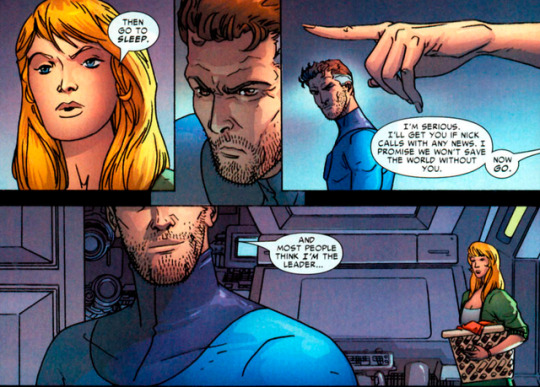
But it’s not as though these panels have no precedent, even all the way back in 1970′s Fantastic Four v1 #98:

Reed and Sue’s relationship has simply never been what fandom makes it out to be -- one that is profoundly unequal, where Sue gets no say at all in anything. It’s always been more of a back-and-forth, more of a partnership. Sue has always had the power to order Reed around (in certain contexts, at least) and Reed has always listened to Sue and her advice. Her power and influence has indisputably increased over the years, but it’s important to note that it was never wholly absent.
I could also point out that Sue has a perfect right to lead the team she was largely responsible for creating. Her role in the formation of the FF tends to be vastly underestimated. Sue was instrumental in orchestrating the FF’s theft of the rocket ship that Reed designed, which has been canon since Fantastic Four v1 #1. Without Sue passionately persuading Ben to fly the rocket (while Reed stood silently by), the flight never would have happened:
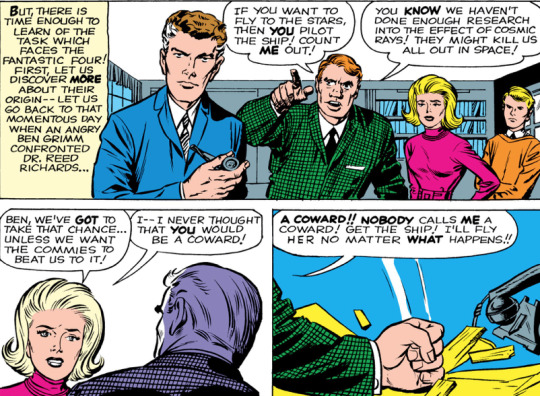
Neither was she solely motivated by her love and loyalty to Reed—in this, the original version you see above, her sense of patriotism had just as much to do with why she decided to accompany Reed on the rocket flight. Later writers have even portrayed Sue as being motivated by a love for adventure that rivals Reed’s and, more importantly, as being responsible for pushing Reed to go through with his plan -- Reed says point-blank that he was “content doing pure research” until Sue “pulled me out of the lab and into your amorphous idea of ‘field work.’” Despite the fact that it’s largely (wrongly) understood as Reed’s plan and Reed’s decision, I think that canon actually points to the theft of the rocket ship as being something that Reed and Sue decided and implemented together—or, arguably, even as more Sue’s than it was Reed’s. He floated the idea. She made it happen. Ben decided to pilot the rocket because Sue talked him into it. Johnny tagged along because of his love for Sue. The FF would never have come into being if not for Sue.
While 1960s Reed has become something of the poster boy for 1960s sexism in fandom, I think that attitude is unfair, inaccurate, and detrimental to fandom perceptions of Sue. At the time, Reed certainly wouldn’t have been read that way -- he gave his wife a great deal of freedom and autonomy for the time period, readily acknowledged that she was more powerful than he was, followed her leadership at times, and even personally trained Sue in hand-to-hand combat. Sue, it’s worth pointing out, has always defied and exceeded conventional femininity’s bounds, and Reed has never had an issue with that -- to the contrary, he’s actively supported and encouraged her. In Fantastic Four v1 #17, for instance, Victor abducts Alicia Masters, and Sue is the one who finds her first. When Victor enters the room, Sue is so confident that she can defeat him singlehandedly in hand-to-hand combat that she calls him her prisoner and says that she’s been looking forward to proving what she can do on her own:
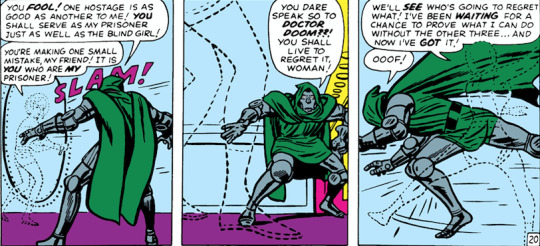
And then she does, and Victor is forced to resort to pointing a gun at her to defeat her (this was before her forcefields):
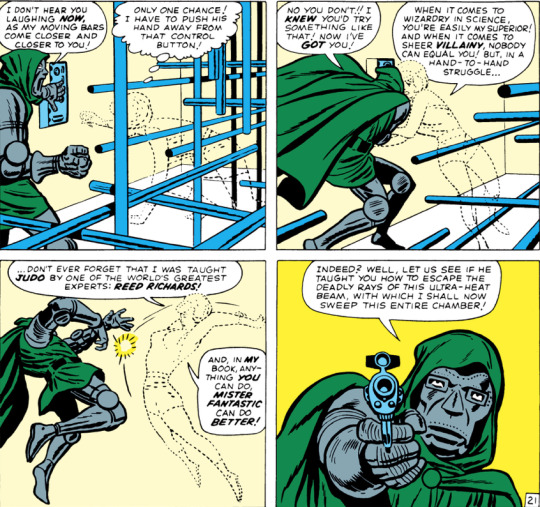
She is so confident that she can beat him in hand-to-hand because she has been trained to fight by Reed, who even in the 1960s thought his girlfriend should know how to fight and didn’t think it too unladylike.
Furthermore, I would argue that Sue chose to marry Reed rather than Namor precisely because Reed was significantly more respectful of her agency, consent, and right to self-determination and bodily autonomy than Namor ever was (...not that that’s a high bar). In Fantastic Four v1 #11, Reed, while discussing his and Sue’s lengthy romance (at the time, they were childhood sweethearts who had known each other their whole lives), brings up the fact that Sue has not decisively chosen between him and Namor. Sue tells him that she doesn’t know how she feels, and Reed very respectfully says that he understands how she feels and promises he won’t mention it again until she does, a promise he, crucially, keeps.
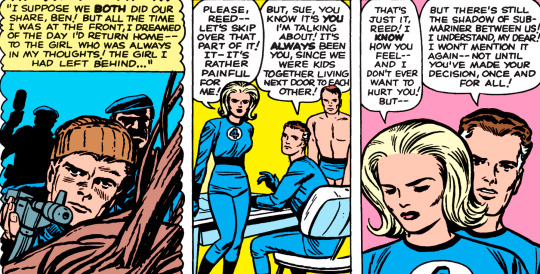
Fantastic Four v1 #27, however, is the pivotal issue where Sue definitively chooses Reed over Namor, and she does so because Namor proves to her that he has no respect for her or her wishes while Reed proves that he does. The issue begins with Namor deciding unilaterally that he has waited long enough for Sue to make up her mind -- he wants the decision made on his terms, at his pace, rather than on Sue’s. So he announces to his people that he’s going to marry Sue now (without having bothered to ask her what she wants, if she’s ready, etc.) and then goes to the Baxter Building and beats up Sue’s family. When she arrives, she is horrified at what he’s done and frantically tries to see if her 17yo baby brother is all right, but Namor knocks her out and abducts her. She wakes up to find herself trapped in a glass bowl and screams to be let out, but Namor ignores her pleas:
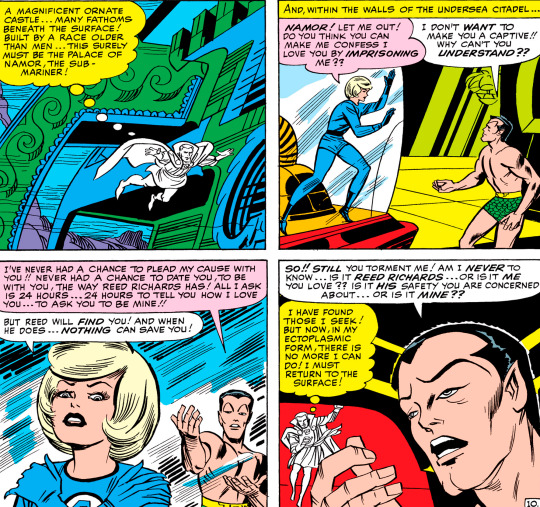
This is a clear violation of Sue’s right to bodily autonomy and self-determination. She does not want to be in that glass bowl, but Namor does not listen to her or care about her consent. Namor is attempting to coerce Sue into behaving as he wishes -- i.e., imposing his will on her -- rather than allowing her to make up her own mind as Reed did. And he has the colossal gall to literally blame the victim by implying that she made him abduct and imprison her because of her indecisiveness. Reed, let me point out, never felt the need to do the same, despite being in a worse situation, given that he and Sue had known each other their whole lives, been dating for years, and were virtually engaged before Namor showed up. Despite all that, when Namor taunts Reed by asking what he would do if Sue chose Namor rather than him, Reed replies that Sue will, of course, decide for herself -- but on her time and her terms, not on Namor’s or Reed’s. Sue, unsurprisingly, announces at the end of this issue that she loves Reed and not Namor, and that was the end of the love triangle for the next decade.
Reed continues to be uncertain about her feelings, however. He doesn’t propose until Fantastic Four v1 #35, and he does so only after Sue herself says that she has been waiting for him to propose and echoes back the phrase (“It’s always been you!”) that Reed used to declare his love for her in Fantastic Four v1 #11. He waited until she signaled to him that she was ready, on her own terms and at her own pace.

I keep reading people wondering why Sue would have chosen a nerd like Reed over a hunk like Namor, and this is why. Reed proved to Sue that he respected her right to decide who she loves on her time and her terms, and Namor proved definitively that he did not.
And even after Sue marries Reed and has a baby, she does not quit the team or remain at home. While she does take a brief leave of absence during her pregnancy, she returns to active duty in a rather spectacular way. Reed, Ben, Johnny, and Crystal are all in Latveria, powerless, and on the verge of being blown up by Doom’s bombs, along with the village they are in. The bombs go off...and everyone is mysteriously fine. No one can understand why they’re still alive until Sue materializes, and they realize that she saved everyone with her forcefields.
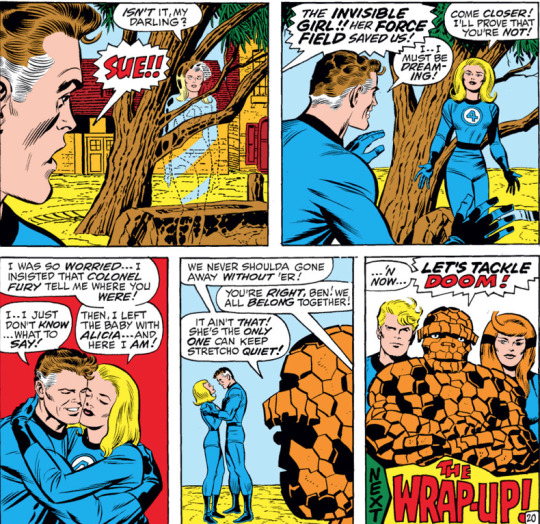
Reed is overjoyed that she’s there -- despite the extreme danger -- and not at all upset by the fact that she has returned to active duty. Let me also point out that there was never any question of Sue leaving the team after she married Reed or even after she had a baby, and this at a time when it was expected and commonplace for women to quit their jobs and become housewives after marriage. Reed, Ben, Johnny -- they all simply assumed Sue would continue on the team as she always had.
So of course comics in the 1960s were sexist, of course Sue was sometimes frustratingly passive and silent by today’s standards, but that doesn’t erase or diminish all of the times when she was not. Sue has been fighting tooth and nail to assert herself as an equal for decades, and personally, I think that her tenacity, determination, and courage even when belittled and underestimated by the men around her make her just as much of a hero as her superpowers, if not more so, and I am, frankly, tired of fandom's constant belittlement of Sue.
#fantastic four#susan storm#reed richards#prime marvel universe#comics#meta#mod: lamujerarana#long post
158 notes
·
View notes
Text
WandaVision series review part 1.
Because I have some things to say.
This is going to be posted on March 19th, at which point the WandaVision (WV) finale will have been out for two weeks; also the day Falcon and the Winter Soldier (FatWS) begins, which I have, for whatever reason, begun to think of as WandaVision's sequel, despite being a completely separate series. In 2019, FatWS was actually scheduled for before WV, so that makes no sense.
Anyway, I'm going to begin with a spoiler-free review of the series as a whole, then I'm going to go into an episode-by-episode breakdown as I re-watch the show, but the spoiler-free section will contain spoilers for the rest of the MCU. This part will cover episodes 1-3, part 2 will cover 4-6, and part 3 7-9. I’d love to do this in one post, but it’s just a little overwhelming.
If for whatever reason you don't know vaguely what WV is about, you've been living as a hermit for literally the last six years. But if you don't know: in 2015, Marvel Studios released Avengers: Age of Ultron (AoU), technically the second movie in the 'Avengers' franchise, but the eleventh movie set in the MCU, the Marvel Cinematic Universe. AoU introduced three main characters to the MCU: Vision, a synthezoid-human-robot-AI-android thing, who I would call a person but it's complicated - his consciousness is derived from the mind stone, one of six infinity stones, JARVIS, Tony Stark/Iron Man's AI assistant, Tony Stark himself, Bruce Banner/the Incredible Hulk, Thor, and Ultron, the villain of the movie, who's more of a robot than Vision, but he's not the point. The movie also introduces Wanda and Pietro Maximoff, known in the comics as Scarlet Witch and Quicksilver, though they are never called this in the movies. The Maximoffs are twins who volunteered for experimentation from HYDRA, an evil Nazi organisation who provide the main antagonists in the Captain America trilogy. We are told they each gained superhuman powers from the mind stone - Pietro has an increased metabolism and improved thermal homeostasis, and Wanda can do neural electrical interfacing, telekinesis and mental manipulation, or, in the words of Maria Hill, 'He's fast and she's weird.'
Pietro Maximoff is promptly killed by somehow failing to dodge bullets, while Wanda and Vision join the Avengers, and eventually fall in love. I'm not explaining Avengers: Infinity War. Or Avengers: Endgame. If you haven't them, why are you reading this?
Anyway, so Avengers: Endgame is the third-to-last movie in Phase Three of the MCU, but is the last part of Wanda and Vision's story pre-WandaVision, and wraps up with Vision dead and Wanda grieving.
So, should you watch WandaVision? Yes. Absolutely.
We already know our two main characters and several of the other characters, including Monica Rambeau from Captain Marvel, grown up, Darcy Lewis from the Thor franchise and Jimmy Woo from Ant-Man and the Wasp, but we're also introduced to a cast of new characters, mainly new villains (but then superhero movies so rarely use old villains), who are well-developed and intriguing - you'll either love them or love to hate them.
The plot leaves you on the edge of your seat - nearly every episode ends on a cliff hanger, and leaves you with a thousand questions. It answers the bare minimum, the final episode leaving us still with some questions, but it is the perfect way to milk our investment.
On the other hand, if you aren't familiar with the MCU, Wanda and Vision, you may have quite a hard time understanding every aspect. So long as you have a vague idea of the context, you can follow the plot, but you won't enjoy it nearly as much. I really don't think it's worth watching the entirety of the MCU solely for this show, but I also think it's worth watching the MCU movies, full stop.
The series is only available on Disney+, which absolutely sucks. I've had a Disney+ subscription since it was released in the UK, so this wasn't an issue for me, but it does generally suck. Even if you are up to date with MCU movies, if you don't have a Disney+ subscription, you can't watch it. The streaming service stopped offering free trials in July 2020 due to the release of the Hamilton pro-shot, knowing they'd get an influx of new subscribers, but not wanting people to be able to watch it without paying. Capitalism at its finest.
Whether or not the cost of one month's subscription for WandaVision is worth it is subjective - though now all the episodes have been released you could easily watch it and only have to pay once.
Ultimately, I would argue WandaVision is absolutely worth watching, though someone who isn't up to date on MCU films wouldn't enjoy it as much as someone who is, and with its runtime of just under six hours, broken into nine episodes, it may not be worth the Disney+ subscription for you personally, especially if you're not up to date on the MCU. However, I would like to end this section on a positive note: I cannot get over how awe-inspiring the storytelling on this show is. Marvel has its issues with storytelling, with things often feeling disjointed in an attempt to remain unpredictable and prevent actors (*ahem* Tom Holland) spoiling events, but WandaVision doesn't feel that way at all. It's unlike any superhero show I've seen before, plays on morality and plays with sitcom formats from the last 70 years, meaning you'll love it even if, like me, you're not a fan of action-focused media - the only long action scenes occur in the last episode.
So, yes. five stars.
~SPOILER ALERT~
Beyond this mark, I'm going to go into an episode-by-episode breakdown, and it will be basically all spoilers from here. If you haven't seen the show and care about spoilers, go away. Please don't spoil yourself.
Also, in each episode's breakdown, I may point out foreshadowing and things I only notice because I've watched it already, so unless you've seen all nine episodes, you may find spoilers even if you only read about the episodes you have seen.
I watched WandaVision episode by episode as it was released, and since the first two episodes were released nearly two months ago, I'm going to re-watch the show and break it down as I go.
Episode One: 'Filmed Before A Live Studio Audience'
This episode was released on January 15th along with episode two, and I didn't actually watch it until the Sunday because I wasn't invested yet, and, of all the MCU shows announced, this was kinda the one I was dreading. Before this show, I loved Wanda, but hated Vision, so I also hated their romance. I'd also seen the sitcom-style trailers and was absolutely terrified it would be terrible, so I wanted to finish the season of the show I was currently watching before watching the episodes.
So let's get into it.
The episode is only 29 minutes along, including the nearly-ten-minute credits, which is pretty standard sitcom-episode length. We open with the Marvel introduction, but as the camera zooms out, we're shown the logo in a fuzzy, monochrome, early-1900s style. The aspect ratio also decreases, which is a nice touch but very annoying because the show itself has a larger ratio, meaning there's a lovely thick black border all the way around the frame. But that's just a formatting complaint.
We move into a 50s-sitcom-style song-montage in which Wanda and Vision, looking human like that single scene in Infinity war are coming home, just married. Wanda magically buys the house and with some weird Vision-power stuff, he carries her over the threshold to their new house, and we see the logo.
Thoughts at this point? Just what? How is Vision alive? Why is it black and white? Why is there a musical song? Why are we in the 1950s? How are they married? Why aren't they being Avengers? Just sheer confusion.
Wanda uses her powers in this episode without her typical red-smoke-sparkles, and they make a lot of gags, received with a laughing track, about their powers, but generally follow a sitcom formula, with the plot of having Vision's boss for dinner and needing to impress him.
Also, it’s noteworthy that what little was left of Wanda’s Sokovian accent by Avengers: Endgame has completely vanished.
It's very odd to see Vision as Vision, as in synthezoid would-be-red-if-it-weren't-in-black-and-white face, dressed in regular clothes instead of his cape and superhero get-up. It seems like his superhero clothes aren't actually a part of him, but when he walks through things, they go with him, though he can't take other objects with him. This could be because they were made at the same time as him, but he also takes his other clothes with him. That's just a question as to the limits of his capabilities, though.
We're quickly introduced to their new neighbour, Agnes, cast in the role of Nosy Neighbour, but the cast of this episode stays incredibly small. Agnes mentions her mother-in-law being in town and talks about her husband Ralph, though neither of these characters are introduced.
Vision goes to work, raising the question of why a superhero synthezoid needs an office job, especially one he apparently doesn't know the purpose of.
Later, Vision calls Wanda from work, and she answers the phone as 'Vision residence', which is confusing on a number of levels. Wanda is a perfectly normal name, perfectly able to blend into this setting - Vision is not. Especially when he has no surname and this answering gives the impression Wanda has taken his name, and literally become 'Wanda Vision,' which is likely the point, but confusing nonetheless.
Here comes a 1950s style advert, advertising the 'ToastMate 2000'. In the ad, the two people put bread into the toaster, which toasts and beeps for an unnervingly long time before coming out. We're then told it's made by Stark Industries (Iron Man's company) with the slogan: 'Forget the past; this is your future!' Ominous, and clearly playing into the fact we seem to be on an alternate timeline.
Towards the end of the episode, Vision's boss's wife, Mrs Hart, begins asking questions about their past - where they moved from, how long they've been married, children, etc. - and Wanda and Vision freeze, trying to answer, but apparently unable to remember. Mr Hart, Vision's boss presses, but they fail to answer. Mr Hart begins to choke, and Wanda and Vision freeze, while his wife laughs, telling him over and over to stop it, until he falls out of his chair, and Wanda tells Vision to help him, which he does using his powers, though neither Mr nor Mrs Hart question this, and quickly leave, having barely eaten. Overall, the dinner is apparently a success.
Wanda and Vision realise they don't have wedding rings, and Wanda makes some, in a clearly cut-together shot reminiscent of the intended style. The camera then pans out to 50s-style credits, crediting the two cast members, producer, director, writer, photographer, music director, production manager, supervising editor and several other roles, with names I'm sure have some relevance, either to real cast members or some comic reference, but don't mean much to me.
The camera continued to pan out, showing the episode playing on an old fashioned TV in some kind of technological/industrial room. A hand presses a remote button, and we cut to the real credits, against a background of warped shots of screens, which then zooms into the pixels and we see a load of formations, such as of their house. Credits which are seven minutes long, though the length has nothing to do with the show itself.
One more thing: it's hard to notice during the episode, but during the credits we see a warped shot of Vision, in which his eyes appear human, where previously they've been fairly robotic.
This episode brings up a million questions and answers literally none, so, glad there's another episode, we move on. I enjoyed this episode, and enjoy it more the second time round, now knowing the answers to most of my questions, but it's so frustrating.
Episode Two: 'Don't Touch That Dial'
This episode is 36 minutes long including credits, which is still fairly standard sitcom length. I watched this one directly after the first, and my frustration only continued.
Something I've only just noticed watching this the second time through: this episode opens with a recap of the first, and it recalls the events without including character introductions--except for Agnes. The recap includes her introduction, but nothing else of her, which, even though she's technically irrelevant in episode one, clearly means the writers are trying to make the audience remember her.
The comedy-style intro to this episode is in a cartoon-style, which opens with an image of the moon surrounded by six stars which light up in turn, a nod to the infinity stones.
Here, Wanda and Vision--Wanda especially--are wearing less traditional-50s clothes, though the first time round I didn't question this because Wanda's hair was nearly the same--just a little longer and more relaxed--and so was the way it was shot, the black-and-white, and the aspect ratio. I didn't quite make the decade-jumping connection, though looking back it is fairly obvious we've shifted to the 1960s.
Since this episode still follows a comedy formula, in which every episode has its own arc which rarely intersects others, the plot of this episode is Wanda and Vision participating in a town talent show and attempting to blend in. After the intro, we see Vision practising, and Wanda brings out a cabinet of mysteries for their act, which has an image reminiscent of the mind stone on the doors.
With Wanda acting as Vision's magical assistant, he gives her the name 'Glamour,' a nod to her powers, and 'glamour' in the more magical, less-celebrity sense. It also matches Vision's magician's name, 'Illusion,' from which it becomes a nod to the fact this whole set-up seems so abnormal, and, an illusion or glamour.
Before the intro to this episode, we see Wanda and Vision getting woken up in the night by some banging. Later in the episode, we hear whirring and another bang, which prompts Wanda to go outside to investigate, where she finds a crashed toy helicopter, in colour. The helicopter has a sword symbol on it--the first time we see this.
Agnes then brings Wanda a rabbit for the magic act, who she calls Senor Scratchy, a reference to Nick Scratch, a colloquial name for the devil. This was part of what led to initial speculations about which character was actually comic-villain Mephisto in disguise - WandaVision also draws heavily from comic series 'House of X', in which Mephisto is the villain. Obviously, people began assuming Agnes was either Mephisto in disguise, or working for him.
Agnes then advises Wanda about Dottie, the leader of some organisation Wanda is apparently trying to join. Skip to the meeting, Wanda emulates Dottie’s actions to appeal to her. Dottie is then rude to a woman giving some sort of account, but she forgot to ask about the chairs, to which Dottie says ‘Devil’s in the details, Bev.’ Agnes then says to Wanda, ‘That’s not the only place he is,’ which added to the speculation about Mephisto.
The committee Wanda is with is working on the talent show to raise money for the elementary school--’For the children.’ This phrase is repeated throughout the episode, and foreshadows Wanda’s motivations as the show progresses. Wanda meets a woman named Geraldine, who says she feels out of place, foreshadowing her true identity, and how she, personally, came to Westview.
Meanwhile, Vision attends a neighbourhood watch meeting and one of the men offers him a stick of gum, which he takes despite the fact he can’t actually eat food, as a synthezoid. One of the men slaps him on the back fondly, and Vision swallows the gum, which we see as a cartoon of it going down his mechanical oesophagus.
Wanda stays behind at the committee meeting to help Dottie clean up, and Dottie tells her she’d heard things about Wanda and her husband, which Wanda responds she ‘doesn’t mean anyone any harm,’ and Dottie tells her she doesn’t believe her, as though she’s mentally returned to reality, continuing to foreshadow the reveal in the next few episodes. The camera zooms in, the music intensifies, and a voice comes from the radio beside them, asking if Wanda can hear him. Dottie asks, panicked, who it is, and who Wanda is. The radio short-circuits, and Dottie breaks the glass she holds, cutting her hand, and the blood is red.
The advert in this episode contains the same actors from the previous one, this time advertising the Strucker watch--a reference to Wolfgang von Strucker, a Nazi villain from the Captain America franchise; also the head scientist on the experiments which Avengers: Age of Ultron claims gave the Maximoff twins their powers. The slogan is ‘He’ll make time for you,’ which, even now, I’m not completely sure what it’s a reference to, or who the ‘he’ could be, but it seems to further suggest Mephisto’s involvement, despite that not actually being the case.
Cut to the talent show, Wanda panics because Vision is late. He shows up, walking and acting as if drunk, and we’re shown the gum is stuck around some gears in his gut. On stage, Dottie makes the audience chorus ‘for the children’ again, and Wanda and Vision come out. Because of the gum stuck in Vision, the act goes sincerely wrong, and he uses his powers out in the open, but Wanda manages to use hers to apparently hide this from the audience. They bring out the cabinet of mysteries, and Agnes asks sarcastically if they’re sure they don’t want an audience volunteer named ‘my husband Ralph?’, the second mention of Ralph in the series.
Vision taps the box with his wand before Wanda gets inside, and the audience starts chanting ‘What’s in the box?’ Wanda panics, does something with her powers, and opens it to reveal a very confused Geraldine inside. Their act ends, and Wanda uses her powers to find and release the gum stuck in Vision, and he seems to ‘sober up’. They try to leave, but Dottie calls them up on stage, praises them and presents them with a trophy for their comedy. Wanda calls up Geraldine, who asks what happened, but they play the ‘magician never reveals his secrets’ card.
They get home, and joke about it, repeating ‘for the children’. Wanda gets up, deciding to get popcorn, and is suddenly quite pregnant, where she very much wasn’t before. There’s a thud outside, and they go to investigate. A manhole cover in the road shifts, and somebody in a beekeeper’s suit, with the sword logo on the back, emerges, face in shadow. Wanda merely says ‘no’, and we rewind to before the thud. Colour then begins to bloom onto the screen, and the episode ends, with an echo of the voice from the radio.
Looking back, I think the shift to colour on Wanda’s part may have been a decision because of the helicopter, and the blood--the beekeeper prompted it, but she’s trying to hide the fact that the things which do not belong are so obviously out of place.
This episode holds no more answers than the last, and has the same comedy tone with the ominous undertones as the last, but also contains significantly more characters and locations, as though this sitcom world has expanded.
And then we had to wait a week for episode 3.
Episode Three: ‘Now in Colour’
And we shift to the seventies. This episode’s recap recalls all the major points of the last episode, including Geraldine’s introduction. This episode is only 32 minutes including credits; longer than the first, but shorter than the last, so we’re still sticking to the comedy format, and the episodes aren’t yet lengthening.
Just a point a little irrelevant to this: WandaVision’s total runtime is about six hours, and we’re getting six FatWS episodes, which is probably about the same runtime but a little disappointing (though that’s mostly because it means there’ll be a couple weeks where we get nothing between it and Loki).
The introduction to this episode is more classic sitcom, with the long pop-style song over a montage of the characters--exactly what you’d expect from the seventies. The episode opens with a doctor at their home, who tells them she’s about four months along, which she obviously isn’t. Vision questions how this happened, but it becomes fairly clear to the audience this is Wanda’s doing. Vision asks the doctor not to tell people about the pregnancy, and sees his neighbour to the non-Agnes side, Herb, trimming his hedge, but the hedge-trimmer is going through the garden wall, and he hasn’t seemed to have noticed. Vision points this out, Herb verbally acknowledges him, but keeps going.
Vision returns inside, and Wanda’s pregnancy has progressed even further. Wanda uses her magic to prepare the baby’s room, and her magic is still missing her signature scarlet, a continuing sign something is wrong. The baby kicks, Wanda describes it as ‘fluttery’, and accidentally makes the butterflies on the baby’s mobile real.
Vision mentions the name ‘Billy’, and Wanda says ‘Tommy’, ‘a nice, classic American name’, returning emphasis to their efforts to fit in. Wanda gets Braxton-Hicks contractions, and her powers turn on the tap, open the window, flare the lights--the pregnancy causes her to lose control of her powers, and the block’s power goes out. Wanda mentions the people of Westview ‘always seem to be on the verge of discovering [their] secret’, and Vision says something seems wrong there. The music intensifies and the camera zooms in, then we cut back to before he said that, but without the rewind sequence we saw in the last episode.
And Wanda goes into real labour, sending Vision in a panic. Then it begins to rain inside, and Wanda comments she thinks her water has broken.
Cut to commercial! Same actors again, this time for Hydra Soak--’find the goddess within’. It’s a bath product meant to take you away from your problems--a reference to Wanda’s apparent escape from what she was left with after Endgame. I’m not completely sure what all the HYDRA references are about, even after watching the whole series.
It stops raining inside, and Wanda opens the windows to dry out the house, and I cannot get over how perfect her hair is in this episode. It’s perfect in the others, too, but this time, it’s perfectly straight, not a strand out of place, and I just can’t get over it.
Vision goes after the doctor, who was about to go on vacation when he left, and the doorbell rings. Wanda puts on a coat to hide her belly, and welcomes Geraldine in, but tells her it isn’t a good time. Wanda gets a contraction, and her coat transforms. And again. So she throws it off, and uses a fruit bowl to disguise it, but Geraldine doesn’t leave.
A stork appears behind Geraldine, apparently the one Vision painted on the nursery wall earlier, and Wanda has to do her best to keep Geraldine from seeing it. She tries to make it vanish in a cloud of red smoke, her typical magic, but fails, and Geraldine eventually hears the stork, but Wanda tells her it’s the ice maker.
The baby, however, it very quickly coming, and Geraldine sees Wanda’s belly. She lays Wanda down, and she births the baby, while light fixtures break and paintings spin, before Vision arrives. My God, her hair is so damn perfect. The baby’s a boy, and Vision concedes to Wanda’s name choice of Tommy. Then Wanda screams again, and Billy is born. For the children.
Vision goes outside with the doctor, and asks about his trip. The doctor tells him that small towns are ‘so hard to... escape,’ yet another ominous implication. The doctor leaves, but Herb is still outside, now without the hedge-trimmer, but with Agnes. They whisper about something, then Vision goes over. Agnes says ‘Ralph looks better in the dark, so I’m not complaining,’ when he asks if they lost power, too. And Agnes asks if Geraldine is with Wanda, as though she is suspicious, though knowing how episode seven ends, her true concern is clear.
Inside, Wanda tells Geraldine she’s also a twin, and the music intensifies. Geraldine says, ‘He was killed by Ultron, wasn’t he?’ in reference to Pietro--Quicksilver.
Agnes says Geraldine is new to town, no husband, and no home.
Wanda asks what Geraldine said, but Geraldine goes back to complimenting her. Wanda presses, but Geraldine’s sudden clarity seems to have gone. Then we zoom in on Geraldine’s necklace, and it’s the Sword logo.
Herb tells Vision Geraldine ‘came here because we’re all...’,but Herb can’t get the words out.
Wanda asks about the symbol, who Geraldine is, but she says she doesn’t answer.
Agnes makes Herb stop talking, and leaves. Vision returns inside, and Wanda tells him, rather monotonously, that Geraldine had to return home. But the camera cuts to the Westview sign, suddenly with a wider, more modern aspect ratio. It’s night, the air ripples like TV static, and Geraldine comes flying out, as though pushed. She collapses on the ground; cars approach, a helicopter casts a spotlight on her. We pan out to some kind of camp, and cut, to that dreaded ‘Please stand by’ credits screen.
And episode three ends, leaving us still without answers, but at least a little confirmation of something malevolent occurring.
So, that’s my initial overview and breakdown of episodes 1-3. Part 2 will contain episodes 4-6, and part 3 7-9 plus my final thoughts.
But that’s that for this week’s post; the next two parts should be up next week and the week after, unless I have something I want to post more.
Anyway, go drink some water, eat something if you haven’t eaten in the last few hours--you’re amazing, you’re beautiful, and you so deserve everything you have, and more.
Bye!
#wandavision#marvel#mcu#avengers#marvel cinematic universe#disney#disneyplus#disney planes#the avengers#wanda#wanda maximoff#scarlet witch#vision#quicksilver#maximoff#tv review#show review#programme review#tv show review
0 notes
Text
#personal
It can be a nightmare after all these years to be too transparent for public record. I imagine it would be something like a poltergeist; always bumping into things and being misinterpreted or read into. The age old posit of “Shit Happens” doesn’t leave much room for argument or even proof of life Nobody ever seems to hear my side of things other than when I write about it here. Nobody registers the endless frustration because I hide it all so well. I changed a lot of my routines in the last two weeks specifically. A year ago I started getting harassed at the gym so I changed my schedule there to an early one. Eventually I quit the gym altogether. These days I don’t even own a gym membership. The Nike Training App core routines and some barbells have delivered far more than the stress I had leaving the house. I think I’ve learned over time that Yoga and Pilates in the back bedroom teaches you more about form and control. I use a mirror to monitor my posture. I don’t feel any prying eyes on me behind closed doors. For years everybody knows I’ve been my own coach and source of motivation. The source of inspiration is a given and that’s always been fiercely personal to me. The fact that it should be so obvious is something I’ve learned to enjoy because it is to me. But nobody particularly knows or cares what goes on in my personal life other than here where I write. They forget about the weeks and the work therein. So I probably resemble a ghost clanking with chains in the hallways. There’s no causality because nobody pays enough attention to accept I exist. I’m stuck in a limbo between the known and unknown. There’s some attention I avoid. I avoid heavy doses of it every day because I know better. It’s sticks out like a sore thumb socially and I’ve had to practice a sort of poker face. People often have a habit of expressing their distaste that I think for myself. I changed my train route to work. I still bump into awkward invisible walls. People trying to hijack my narrative in public. People afraid of ghosts I guess. Some cultures leave offerings for the dead. Others try to exorcise and eradicate them. Some people throw dust to the wind and some people keep their loved ones in a jar above the fireplace. I’m still alive clawing at the fabric of society and not so much reality. Society is fake this we all know. More obsessed with post truth and fake news than statistical based science. I used to have more dread towards my situation. That I would be completely forgotten and misunderstood for the rest of my life. Obviously people following me around on my commute regardless of my route disproves that fate. People treat me like Frankenstein sometimes. Pitchforks, torches and all. Every other week I’m on trial for a different section of my being. I’m a patchwork of things I’ve picked up from art school year after year. And year after year there’s something else that claims it’s cooler, fresher, and more alive. A good excuse to keep me buried. To keep the heresy out of plain sight. And then there’s me banging away at the keyboard early in the morning on the internet like a spirit in the tv static. People free to read into the message however they please. Most people just surf right through me. The noise is still out there every Saturday pulsing like a brain in a petri dish. The horror.
I read this article about how they were growing brain tissue in a lab. There was this rhythmic pulse of electricity that they couldn’t explain. The ethics of testing on conscious living material are dicey at best. So are half the relational aesthetics driven social experiments done in the name of justice and revolution. What is right and normal is a lengthy discussion. But it requires dialog. Sometimes I feel like that brain in a dish trying to give a signal but nobody wants to acknowledge. No one wants the inconvenience of reading how I really feel. My routine the last year has been fairly measured and predictable. Yet people still feel the need to watch and make sure. It’s been a bit of an insult to come full circle a year later and know full well I told you so. And some of that sting from my own pride is softened by the fact that I broke free from the petri dish a long time ago. Patch worked my own identity in the face of valid harsh criticism. I am who I am and I accept pretty much everyone at face value. I have saved so much face this year that I’ve become more weary of public and how much it takes to put on the act and show. For all the revolutionary movements I’ve supported and all the calls to action I’ve heeded nothing much has changed for me. In America there is this endless cycle of outrage. Right versus left. Good versus evil. Black versus white. And it spirals into a fractal of endless opinions and vitriol. Nothing gets defined. Compromise is completely nonexistent. Closure is a luxury most cannot afford. You can’t have closure without getting yourself wrapped up in a bigger drama which limits and belittles the argument in favor of populism or worse. The tribe of public opinion has spoken. You have been voted off the Deleuzian Island you were shipwrecked on. A reality exposition in front of camera phones and a conscripted army of influencers. America has moved from clique to tribe. Everything is a little more Mad Max than it used to be. On the weekends I still stare out my kitchen window early in the morning. People have so many hidden expectations for me now it exhausts me just thinking about it. It is pure mental anguish to read into all the projections and there’s no real payoff. What statement shirt will I see today. What hidden message or Easter Egg do I have to squint my eyes at to prove I’m fully woke. It’s what is expected of me to be left alone I guess. Yes I’m ok. Yes I have a job. Yes I keep myself busy. Yes I keep myself out of trouble. Yes everything outside of my apartment these days seems to be causing me more trouble than it’s worth. Yes I’m very sad on the inside. And yes none of that really matters because when I shut the door and think about the people I care about it’s all worth it. Because I’m not some experiment in a dish that demands some qualitative proof of my usefulness to science, life and America. I’m my own science project. A mixture of phantom, shade and shambling mound. I figured out a way to hide the scar tissue in broad daylight and let the sun fill the hollows in my face. I’m the most handsome Frankenstein to walk the Earth. Maybe more of the Hulk for good measure. Aren’t they pretty much the same thing anyway?
Universal Studios actually owns the film rights to Frankenstein down to the makeup. The only Frankenstein movie to ever make it to Japan was because of a guy from Chicago selling the rights to Toho. He’s also the guy that could have boosted Lenny Bruce’s career. He instead launched Woody Allen’s rise to stardom. A parable lies within all of this. Maybe why we’ll never see a decent standalone Hulk movie inside the MCU. Maybe I’ll just read the comics instead and let it play out in my own head. There’s a lot of bullshit that I don’t ever want to be part of. A lot of soul sucking corporate tactics that don’t honor the actual art form. And there’s the reality that money, jobs, and careers make the world go round. I work at a non profit. I make a non profit salary. I’ve lived being made to feel like I’m inferior to money. I’ve learned how to budget myself a return to New York every two months. Someone at work asked if I had any gigs there. I said I quit music because it was threatening my safety. In truth the last year was really about setting up a perimeter in my life. A place that was safe enough and anonymous to share some intimacy with another person. Music didn’t serve that for me anymore. It hindered my goals. How I’ve gone about building fences around my garden has been akin to that scene in Frankenstein negotiating with the villagers. Except in a no holds barred me alone against the court of public opinion sort of way. Modern day Hulk has evolved into a sort of cultured retaliation against the mobs. He’s still too similar to the mad scientist story to make poetic cinema out of it all. Me I live this shit every day. Hulk in Hell. Abused in some ways and blessed in others. People don’t like it when I’m angry. I guess as they say that’s the trick. I’m angry all the time. It’s how I act upon it. How I sacrifice my incomprehensible rage and tortured feelings out of love. For me I spent the whole last year doing something about it. Challenging the infrastructure of all this bullshit and leading by example. Too much force and you break things. Too little and they walk all over you. Lenny Bruce had the entire police department after him for saying what he felt. Woody Allen succeeded in Hollywood. How you view the hypocrisy of all that is all in what you accept and what you resist. Resistance isn’t fun. And it looks different for everyone. The most political battle to fight is the personal one. The right to be and the right to think. What is the real different between Frankenstein and the Human Ken Doll anyway? Who owns the rights to me being me? What gives me the right to have an opinion? Who I can talk to and who I can love? What I need to become to be treated as an equal in the public eye? What people have done to stop me from becoming who I really am? Why do I even care about having a popularly accepted opinion when no one listens? Who has room for drama in their life when I only make space for all the love I have for you? Of all the pieces of my life that I stitched together you are the most important one to me. Because you are the piece that makes me whole just by being you. It’s not a missing link it’s been an important foundation to my struggle. If I keep bumping into you in the dark just remember it’s a love tap. I don’t mind if you tap back. Only you though. Fuck all this other shit. <3 Tim
0 notes